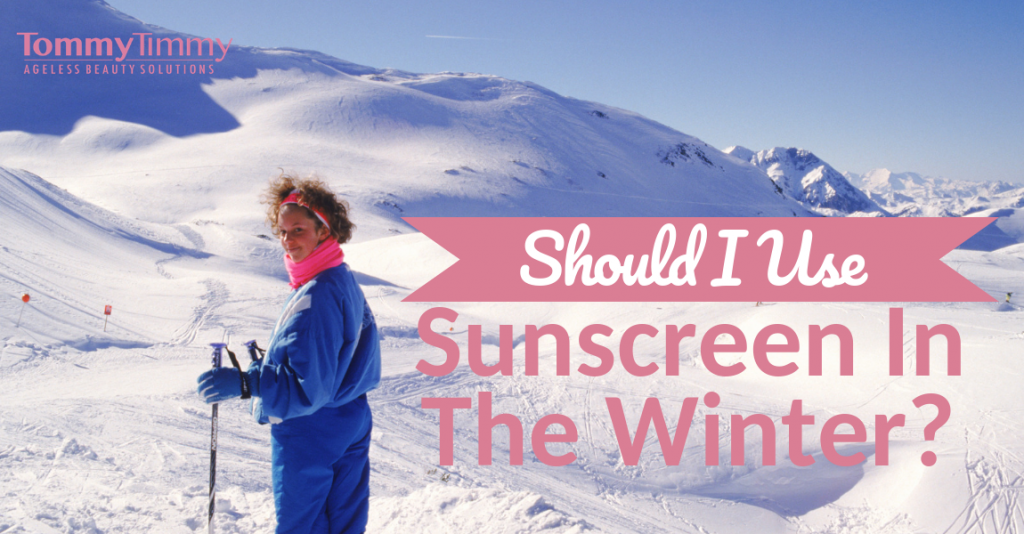

Wearing sunscreen during winter may seem counter-intuitive. But research has proved that no amount of cloud cover can protect your skin from harmful UV radiation. Granted, UVB rays which cause sunburns and redness are much weaker during winter.
However, UVA rays are out in full force all year long. UVA rays are responsible for accelerating skin aging will still reach the earth’s surface. UVA rays account for 95% of rays that penetrate your skin, and their effects are felt much deeper. Applying sunscreen should, therefore, be an all year round affair.
Snow intensifies radiation
The snow and ice during winter reflect 80% of the UV radiation that reaches the earth surface nearly doubling its intensity. On the other hand, sand only reflects 25%. So if the allure of the outdoors is too much for you to bear during winter, ensure you apply a fair amount of sunscreen before you head out.
Winter sports increase the risk of UV exposure.
If you’re a winter sports enthusiast, sunscreen is an absolute necessity. According to research by the skin cancer foundation, the intensity of UV rays increases with an increase in altitude. For every 1,000 feet increase in height above sea level, exposure to UV radiation increases by 4 to 5 percent. If you spend a lot of time snowboarding and mountain skiing, ensure you apply at least 30 SPF of sunscreen to protect your skin from the harmful rays.
Winter weather erodes sunscreen protection
When your skin is directly exposed to the sun, your body will eventually sweat off the sunscreen thus necessitating reapplication. What you may not realize, however, is that harsh winter conditions will actually erode your skin protection even faster. The strong winds and the snow will wear away your sunscreen and eventually expose your skin to harmful UV rays. Applying sunscreen in the morning is simply not enough. You should consider reapplying after every two hours or after sweating.
Your skin is more sensitive during winter
Your skin responds to changes in weather, too. The skin is tanned during summer and gets more pale and drier during winter. The tan is a result of increased melanin concentration to protect the skin from UV radiation. Since the skin is less tanned during winter, it is more sensitive to the sun’s UV radiation. You must, therefore, apply sunscreen constantly to counter these effects. If you have pigmentation spots you can try Intensive Skin Corrector, an amazing product that quickly fads the spots without drying out the skin.
The ozone layer is thinnest during winter
The ozone layer acts as a natural sunscreen. It is nature’s way of protecting your skin from harmful UV radiation that accelerates skin aging. While its effect is strong during summer time, it may not be as effective during winter. Ozone levels are lowest between December and March in the Northern Hemisphere. So you need that bottle of sunscreen even more during winter.
The danger is still present indoors
If you intend to spend most of your time indoors during the winter period, you are not exempt from the dangers of UV radiation. According to Dendy Engelman a dermatologist based in New York, small amounts of infrared and ambient light from your overhead lamps and computer screens can still stimulate your pigment cells. Enjoying the outside view through the window still puts you at risk since UV rays can penetrate glass. Whether you spend your time outdoors or hold up in the house, you still need sunscreen protection.
In summary
Sunscreen is an absolute necessity whether your skin is exposed to direct sunlight or not. Research has demonstrated that UVA radiation can still penetrate cloud cover and eventually your skin thus leading to increased risk of skin cancer and premature aging. Those who participate in activities such as mountain skiing face greater exposure since the snow and ice reflect sunlight and UV radiation increases with an increase in altitude. You need to protect your skin by applying enough sunscreen all year round and more especially during the winter season.
My advice, wear sunscreen all year long, especially on your face. My absolute favorite daily sunscreen/moisturizer is EltaMD UV Daily Tinted Facial Sunscreen Broad-Spectrum SPF40. You also get the bonus that it’s tinted. And, for total body protection I love Neutrogena Ultra Sheer Dry-Touch Water Resistant and Non-Greasy Sunscreen Lotion with Broad Spectrum SPF 100+


